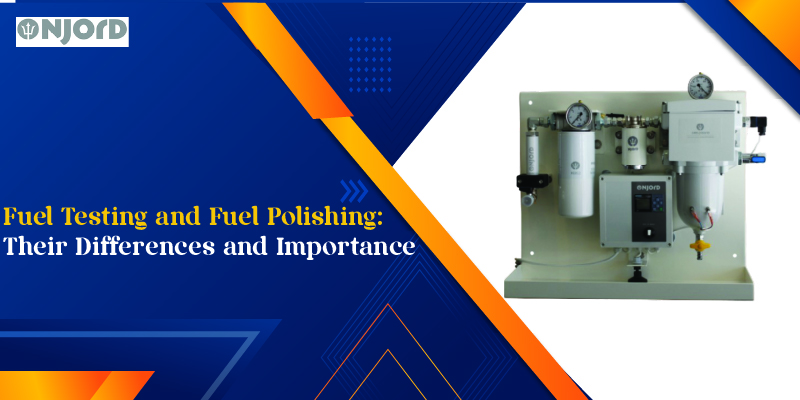Whether in hospitals, data centres, offshore platforms, or industrial facilities, negotiating with a reliable fuel quality is a big NO! Because even a moment of failure during a power outage could cost money, time, and even lives. When it comes to emergency backup systems, many management systems confuse between fuel testing and Fuel Polishing for emergency systems. Well, this is why experts at Njord Filtration will help you differentiate between the two, so that, whether big or small, no industry has to deal with unnecessary consequences.
In this blog, you will find out more about the difference, what their benefits are, and how a balance between both can save your money and time. So, keep reading.
Fuel Testing Vs Fuel Polishing
- Fuel Testing
Now, simply put, Fuel testing is the checkup for your stored fuel. It involves taking samples from storage tanks and analysing them to detect signs of contamination, degradation or microbial growth. The purpose is multifaceted, but it significantly identifies contamination, such as water, sludge, and microbes, while also measuring fuel stability and degradation over time, and detecting corrosion risks in storage tanks. This process typically assesses compliance with fuel quality standards like ISO 4406.
In most cases, fuel testing services check sediment and sludge levels, microbial contamination like bacteria and fungi, flash point and pour point, particulate count, fuel oxidation and acid number, and cloud point and density.
(Also read from our previous blogs: The Importance of a Water Separator in Diesel Fuel Polishing: Expert Advice) - Fuel Polishing
On the other hand, Fuel Polishing is the treatment that removes contaminants from stored fuel. One can say that while fuel testing is the diagnosis, polishing is the cure of the problem. It’s a physical cleaning process that filters out water, debris, microbial sludge and any other harmful substances from the fuel.
Upon doing this, you are not only able to restore fuel to usable condition, but also prevent injector clogging and equipment failure, extend the life of the fuel, reduce emissions and carbon buildup, and finally, allow it to eliminate the need to replace fuel entirely considering this clean fuel is good to go for another 4-6 months based on the environment or the quantity of usage.
Do you need both?
The answer is yes. Assuming fuel polishing is enough for the generators to work efficiently would be wrong and could lead to breakdowns, as we were discussing before.
The following will tell you how a balance of both can benefit you:
- Test First, Then Treat
You wouldn’t start treatment without testing first, right? In the same way, as we said, testing identifies the problem, and polishing fixes it. - Fuel Can Look Clean But Still Be Contaminated
Visually inspecting diesel fuel is not enough, as it may look clear. But in most cases, it still contains unnecessary stuff like dissolved water, invisible microbes and tiny particulates. So when you get the fuel checked, you can also check the condition of the fuel. - Polishing Alone Can Mask Bigger Issues
Yes, fuel polishing can clean and filter out debris, but if you do it without testing, you might miss other factors like tank corrosion, fuel instability and microbial growth. - Dirty Fuel is the reason behind Generator Failure
Many Original Equipment Manufacturers have stated that more than 80% of generator failures are due to contaminated fuel, which causes clogged injectors, sludge in filters and incomplete combustion.
When to schedule maintenance?
Typically, industries should follow this fuel maintenance cycle:
- First month: Fuel testing
- Months 1-2: Fuel polishing if required
- Month 6: Retest fuel quality
- Month 12: Test again and polish if degradation is seen
If you are in an offshore location, consider pre-Storm Season re-testing and polishing, unless maintenance was done recently.
Bottom Line
When it comes to fuel testing and fuel polishing for emergency systems, Njord Filtration has been the most reliable choice globally. Starting from the healthcare centres to industries, our maintenance tool has always offered advanced technology that not just increases the lifespan of the generators but also saves your money for a longer period.
Need expert advice? Get in touch with us here.
